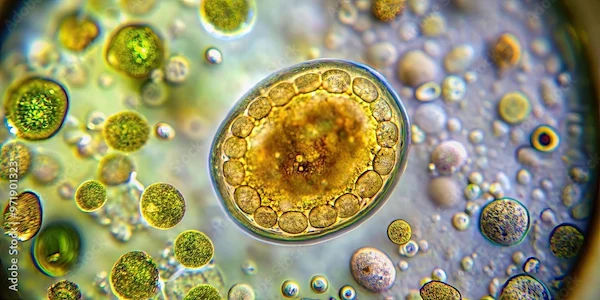How To Reduce Blood Urea?
Learn effective ways to reduce blood urea levels effectively. Discover health implications, dietary changes, hydration tips, lifestyle modifications, and medical treatments to maintain kidney health and prevent complications.

Written by
Last updated on 3rd Jul, 2025
Blood urea is an important biomarker of kidney function and metabolism. During protein metabolism, the liver produces urea. It is found in the bloodstream and filtered by the kidneys, which excrete it into the rest of the urine. Blood urea measurement is crucial for evaluating kidney health in general.
Adult blood urea nitrogen (BUN) is considered normal in the range of 7 to 20 mg/dL. Poor kidney function or high protein intake can increase levels of blood urea. Knowledge of these causes is essential for treating uremia and for maintaining metabolic homeostasis.
Keep reading for more information about how to reduce blood urea.
Health Implications of High Blood Urea
High blood urea levels, or uremia, have significant health implications. Proteins in the liver produce urea, which the kidneys normally filter out. If the kidneys fail, blood urea levels rise.
High blood urea can have some of the possible health implications listed below.
Kidney Dysfunction: This condition frequently elevates high levels of blood urea. When the kidneys can not filter waste products efficiently from blood, urea accumulates in the bloodstream.
Dehydration: Causes high blood urea as the body lacks the fluids required to let the kidneys filter the waste products.
Heart Failure: Heart failure, along with its reduced blood pumping, can be associated with high urea levels due to reduced kidney function.
Liver Damage: High blood urea levels can also be due to liver damage, as the liver is the organ that breaks down proteins and then produces urea.
Gastrointestinal Issues: Gastrointestinal problems like nausea, vomiting and diarrhoea can occur due to high blood urea.
Neurological Symptoms: In a few cases, high blood urea can have neurological symptoms like confusion, seizures, and coma.
Fatigue and Weakness: This occurs when the body cannot get rid of its waste products because the urea levels are high.
Diagnostic Approaches for Elevated Blood Urea
Healthcare professionals recommend the following to diagnose high blood urea:
Blood Urea Nitrogen (BUN) Test: The blood urea nitrogen (BUN) test checks the level of urea nitrogen in the blood. Urea nitrogen is derived from the liver, filtered via the kidneys, and passed out in the urine.
BUN levels normally vary by age, sex and health condition:
Adults: 6–20 mg/dL.
Children: 5–18 mg/dL.
Older adults: A slight increase may be considered normal if the kidneys aren't working very well, which happens with age.
Serum Creatinine Test: This test measures the amount of creatinine in the blood, another waste the kidneys filter out. It can also indicate kidney dysfunction.
Comprehensive Metabolic Panel (CMP): This panel includes tests of BUN and creatinine, as well as important markers, such as electrolytes, liver enzymes, and glucose levels. There is a deeper picture of how overall metabolic health is affected by illness and exercise.
Urinalysis: This test examines the urine for abnormalities, such as protein, blood or glucose, that may result in kidney problems.
Imaging Studies: Structural abnormalities or obstructions are seen on the kidneys with ultrasound, CT scans or MRI.
Kidney Biopsy: A small sample of kidney tissue may be taken for microscopic examination to determine if a specific kidney disease is present.
Understanding the Results
Elevated blood urea should be interpreted to determine its severity.
Mild Elevation: Often due to diet or temporary dehydration.
Moderate Elevation: It could be seen as a sign of early kidney dysfunction.
Severe Elevation: It suggests significant renal impairment requiring medical intervention.
Get Your Health Checked
Dietary Changes for Lowering Blood Urea
Maintaining healthy blood urea levels is extremely critical, depending on nutrition. The right foods can help maintain good kidney health and reduce blood urea levels.
1. Foods to Include
A well-balanced diet is important when controlling blood urea levels. Recommended foods include:
Whole Grains: Essential nutrients and low protein are available from brown rice, quinoa, and oats.
Low-Protein Diet: Plant-based proteins such as lentils and tofu help decrease urea production.
Limit Sodium Intake: Sodium can strain the kidneys. Cut down on salty foods and avoid adding extra salt to the meals.
Consume Alkaline Vegetables: Spinach, kale, and broccoli are alkaline vegetables that help balance the body's pH and kidney function.
Add Anti-inflammatory Foods: Berries, fatty fish, and nuts provide anti-inflammatory support for kidney health.
2. Foods to Avoid
Some foods increase urea production, and these should be avoided:
High-Protein Foods: Red meat, poultry, and fish increase nitrogenous waste.
Dairy Products: Excess consumption raises urea levels.
Processed Foods: High sodium content in processed foods exacerbates kidney stress.
Avoid Alcohol and Caffeine: Alcohol and Caffeine are both known to cause dehydrating effects in the body and can put extra stress on the kidneys. Limit or avoid these beverages. Limit or avoid these beverages.
3. Importance of Hydration
Flushing out toxins needs to be done properly with good hydration. It is advisable to consume:
At least 8-10 glasses of water daily.
To enhance fluid intake, herbal teas and fresh fruit juices.
Medical Interventions for High Blood Urea
If high blood urea is being treated, the underlying cause must be identified and addressed, such as controlling diabetes, hypertension, or dehydration. Treatments are also available to lower blood urea levels.
Healthcare providers may prescribe such medications:
Diuretics: Facilitate urea excretion through urine.
Sodium Bicarbonate: It aids in keeping the acid-base balance and functioning of the kidneys.
Individuals with high blood urea should collaborate with their healthcare provider to create a tailored treatment plan. This teamwork can help reduce the risk of complications from elevated urea levels.
For severe kidney impairment, dialysis is often recommended to remove excess urea. There are two primary types:
Hemodialysis: Blood is filtered through a machine.
Peritoneal Dialysis: Uses the peritoneal lining to eliminate waste.
Role of Lifestyle Modifications to Reduce Blood Urea
Elevated blood urea levels are difficult to control but certainly manageable.
Another straightforward and efficient way is to keep drinking water all day long. Water helps the body eliminate toxins and waste through the body, including surplus urea.
Regular physical activity may influence kidney function and blood pressure, which may help lower protein levels in urine. Exercise helps to improve circulation and kidney performance. Beneficial forms of exercise comprise:
For metabolism, walking and jogging.
To reduce stress and promote kidney health, yoga and stretching.
A nutritious diet with low protein can also help prevent high blood urea levels. Digesting protein-rich foods such as meat, fish, and dairy leads to their breakdown into nitrogenous compounds like urea. Therefore, limiting these foods can help reduce the likelihood of high blood urea levels.
Avoid medications that harm or interfere with kidney functions. Always consult the healthcare provider before starting any new medication or supplements.
Chronic stress can interfere with kidney performance. Some effective techniques to relieve stress include:
Meditation and deep breathing exercises.
Hobbies and leisure activities are being pursued.
Monitoring and Maintenance To Lower Blood Urea
Regular medical checkups help monitor kidney function and avoid any complications. Regular assessments should include:
Monitoring of BUN and creatinine levels by blood tests.
Abnormalities in kidney function detected through urinalysis.
Individuals should consult a doctor if they present with high blood urea symptoms. Seek immediate medical attention on noticing swelling, fatigue, or frequent urination. Tailored treatment plans require a nephrologist consultation. Proper treatment reduces the risk of a normal, healthy life without major health problems.
Preventive Measures to Lower Blood Urea Levels
Preventive measures play a crucial role in kidney health. Key strategies include:
Maintaining a balanced diet with controlled protein intake.
Staying well-hydrated to support toxin elimination.
Engaging in regular physical activity.
Identifying and managing risk factors helps prevent elevated blood urea levels. Common risk factors include:
Chronic kidney disease (CKD).
Uncontrolled diabetes and hypertension.
Excessive consumption of protein-rich foods.
Conclusion
Managing blood urea levels requires a comprehensive approach, including dietary modifications, lifestyle adjustments, and medical interventions. Regular monitoring ensures early detection and timely management of kidney health.
Maintaining optimal blood urea levels is vital for overall health. By adopting a balanced diet, staying hydrated, and prioritising kidney care, individuals can prevent complications and promote long-term well-being.
Consult Top Nephrologists
Consult Top Nephrologists

Dr. Govardhan Gupta
Nephrologist
15 Years • MBBS, DNB General Medicine, DrNB Nephrology
Mumbai
Oscar Superspeciality Hospital, Mumbai

Dr. S Bipin Kumar
Nephrologist
13 Years • MBBS, MD General Medicine, DM, Nephrology
Rajamahendravaram
SG KIDNEY CARE, Rajamahendravaram

Dr. Luvdeep Dogra
Nephrologist
10 Years • MBBS, MD, DM (NEPHORLOGY)
Jaipur
Dr Dogras Health Clinic, Jaipur
Dr Sanjai Maitra
Nephrologist
24 Years • MBBS, MD (Int. Med.), DM (Nephro)
Siliguri
Atrium Diagnostics, Siliguri

Dr. Siddharth Herur
Nephrologist
4 Years • MBBS, MD General Medicine, DM Nephrology
Kurnool
Medicover hospital and Gurudatta poly clinic, Kurnool




